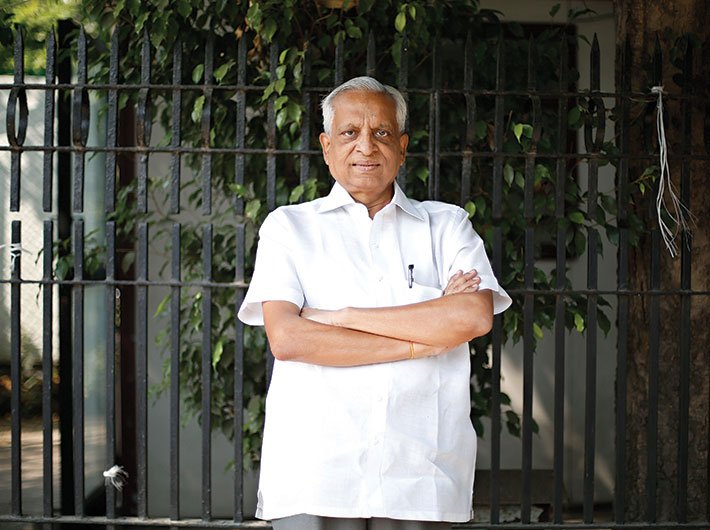Fighting for transparency can be dangerous, as at least 45 activists have found out at the cost of their lives. However, for veteran campaigner Subhash Chandra Agrawal, the Act stopped him from committing suicide
"I was on the verge of committing suicide. The prime of my life was spoiled by a false case and I was ready to end my life. But the RTI Act has proved to be a lifeline for me,” says famous RTI activist Subhash Chandra Agrawal.
Reminiscing about his hard times, the cloth merchant from Chandni Chowk says that for 16 long years he and his family suffered from “judicial torture”. In 1991, his uncle had filed a “false and baseless” case against his father regarding their property in Delhi. His uncle’s son-in-law wielded power as he was a judge in Delhi high court and was later elevated to the supreme court. “Judges of high court, supreme court and even the [then] chief justice of India were all complicit in this false case,” recalls Agrawal. On January 3, 2005 he had filed a complaint with the then chief justice of India against the high court judge, but no action was taken. Frustrated by the “judicial misconduct”, Agrawal was contemplating suicide to end this torture. But a chance encounter with Arvind Kejriwal, now Delhi CM, at the Delhi Rotary club offered a new lease of life to him.
READ: RTI ten years later: The first CIC on its potential for governance
Kejriwal told him about the new law under which anybody can demand information from public authorities. As soon as the law came into force, Agrawal filed an RTI petition, in October 2005, with the supreme court seeking information on the action taken on his complaint. Initially, his petition was rejected by the SC but fortunately he had also filed a complaint with the president’s secretariat on January 10, 2005. The secretariat transferred his petition to the SC and it was then that the court realised that it fell under the purview of RTI. His case attracted a lot of media attention; his uncle finally buckled under pressure and agreed for a compromise. “This is how I realised the power of RTI,” exults Agrawal.
Thus began the making of an RTI activist. So far Agrawal has filed over 6,000 RTI applications seeking information from the public authorities. “Out of my 6,000 petitions I had to come to CIC [central information commission] only for 600-700 petitions. In 90 percent cases I got satisfaction from the public authorities.” He was honoured with the first-ever RTI award by Hamid Ansari, vice president of India, in 2009. The CIC even brought the office of chief justice of India under the purview of the RTI Act after his efforts. The decision, however, has been stayed by the order of the SC.
His RTI applications have been instrumental in bringing to light several cases – how the planning commission spent a whopping Rs 35 lakh on renovation of two toilets; how MTNL is yet to recover Rs 7 crore from several MPs; who are the 36 ex-MPs who refuse to vacate their government bungalows even after their term is over. But which has been his biggest exposure so far? “It’s very difficult to pick just one,” he says, but the petition which forced the supreme court judges to disclose their assets is close to the top.
Agrawal didn’t stop here. One of his petitions revealed that A Raja had a “15-minute-long” meeting with the then solicitor general Goolam E Vahanvati in December 2007. Seeing the extraordinary will of this ordinary man, various chief information commissioners and lawyers, many of whom have retired now, helped him in his mission. “After every hearing, the then CIC Wajahat Habibullah used to train and guide me in drafting a petition in such a way that it gets converted into right to action,” he says.
“I wanted reforms in systems and all my petitions are only about reforms,” says Agrawal adding, “Before the Act it was very difficult to get a response from authorities. After the Act all that arrogance disappeared.”
His passion for reforms goes back to 1967 when he started writing letters to the editors of various publications, raising issues of public concern. In fact he won a place in the Guinness Book of World Records for the highest number of letters to the editor in 2006.
However, for quite some time, Agrawal has not filed an RTI query – his last one was way back in February 2014. Is his mission losing its steam? “I’m a single-man army. There was a time when I used to deal with at least 50 letters and petitions a day. Then there were seminars and lectures. It was becoming practically impossible for me to handle all this singlehandedly.” The 65-year-old had sought support from many corporate foundations and philanthropists, but so far no one has come forward. Agrawal says he is not a “machine” but is determined to continue his fight for justice. “Give me infrastructure and staff and I will continue with my work whole-heartedly.”
Rubbishing allegations that he has stopped filing RTI petitions after the BJP came to power, he gives an example. On September 14, 2013, that is, during the UPA regime, he had filed a query seeking declassification of the Netaji files. After 14 months, on November 21, 2014, under the NDA regime, he got a reply that his petition has been dismissed. “I cannot give full marks to any party. It depends upon both the CPIO [chief public information officer of any public authority like a ministry] and political parties. If the mindset of the CPIO is pro-transparency, then they know how to convince political leadership.”
Agrawal is not close to any party. He is in fact fighting to bring them all under the ambit of the RTI. Six national parties have opposed the CIC decision bringing them under the law, saying this would adversely impact their internal working and political functioning. The central government too has taken the same stance. “Today, all the parties want everybody under the RTI purview, except for themselves. It is unfortunate that lawmakers have become law-breakers. The very political parties which constituted CIC defy its order today. They are insulting their own commission,” says Agrawal.
With a strength that would put a far younger person to shame, Agrawal continues to deliver lectures and seminars, educating people on using the weapon of RTI for common good. He has been working as a consultant with the Delhi government for long. “My experience tells me that the handling of an RTI petition is as difficult as handling a case of parliamentary corruption.” He guides various public authorities on how to respond to RTI plea and eliminate fake and frivolous ones. The department of personnel and training (DoPT) has even incorporated some of his suggestions.
As the RTI Act completes 10 years it continues to empower common people like Agrawal to hold the government accountable. Hailed as a game changer, the Act promotes transparency and has exposed many scams, be it the 2G scam, Commonwealth Games or the Adarsh Housing Society scam. But this tool of justice has it weaknesses too. As many as 45 RTI activists have lost their lives, and many more have received death threats. Didn’t Agrawal fear for his life? “I am a socialist and I don’t care about my life,” he says, adding, “Most of my petitions seek information from public authorities. I never exposed any mafia network and no personal enmity was involved, so I have not received any serious death threat.” But that doesn’t mean he has not been harassed. His RTI query which revealed how redundant Delhi Milk Scheme booths were occupied illegally earned him a series of abusive calls. Also, the revelation of ‘semi VIP’ pyre blocks at the Nigambodh Ghat grabbed media attention and he had a narrow escape from an attack. But these threats never discouraged him.
“I got a serious threat one and half years back. A public authority sent me a threat letter and warned me to take my petition back, otherwise its chairperson will get me arrested by the CBI.” Not revealing the name of the authority or the chairperson, Agrawal says that he had a fortunate escape.
As the Act completes a decade in action, what would be his suggestions for a more robust transparency regime? He says fees should be increased and time-bound decision should come into effect. “To curb frivolous petitions I had suggested increasing the rate of the RTI fees from Rs 10 to Rs 50, with first 20 copied pages free-of-cost.” This will not only reduce the cost but also curb frivolous and irrelevant petitions.
He has another suggestion and it is for a new legislation.
During many CIC hearings, he has observed that people think of RTI as a public grievances redressal system. “They don’t know that this is not a public grievance forum but a right to information forum. There is an urgent need for the grievance redressal bill to come into force.”
He also believes just like Lok Adalats, there should be a mechanism in RTI where public hearings can be held, where petitions can be disposed of in bulk. “Some commissioners give instant decisions in front of the petitioners but some do the process of hearing and stall the decision for months. This is no logic. How will we clear our backlog like this?” questions Agrawal.
After a hearing, the decision should be given in a time-bound manner. A week’s time should be given only if it is a sensitive matter. “After all just like justice delayed is justice denied, similarly information delayed is information denied,” quips Agrawal.
ridhima@governancenow.com
(The story appears in the November 1-15, 2015 issue)

